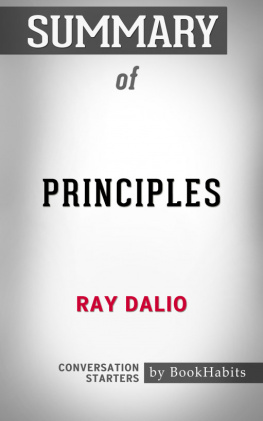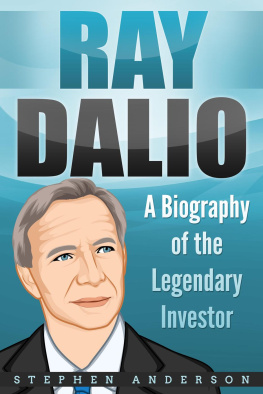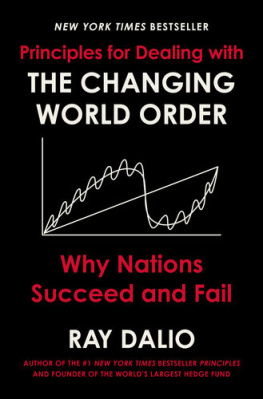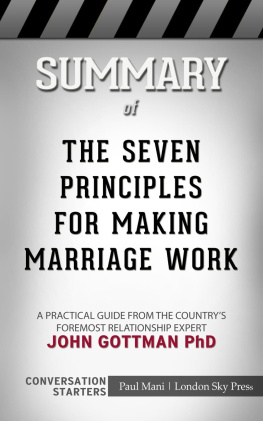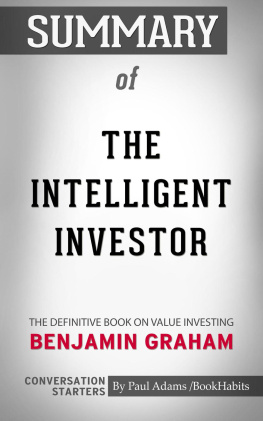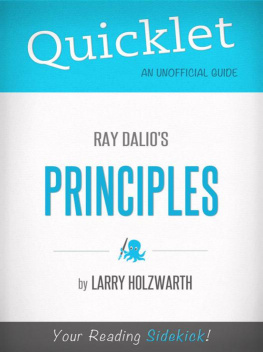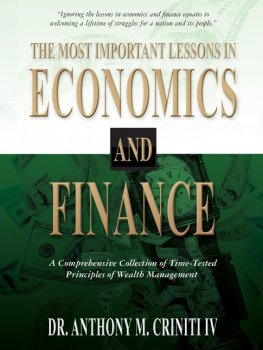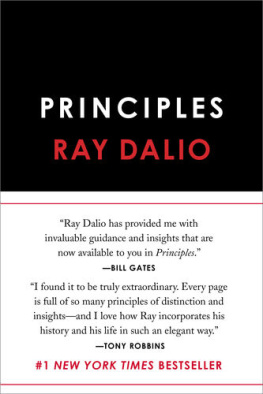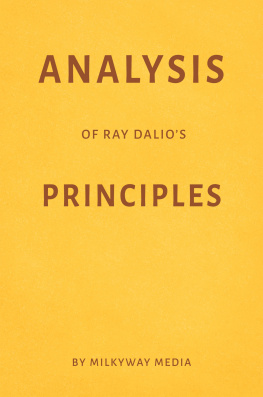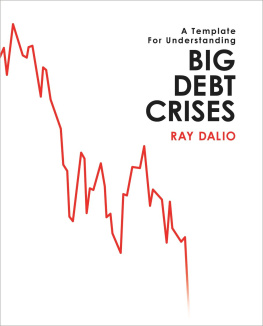Summary
of
Principles: Life and Work
Ray Dalio
Conversation Starters
By BookHabits
Please Note: Thisis an unofficial conversation starters guide. If you have not yet read the original work or would like to read it again , get the book here.
Copyright 2017by BookHabits . AllRights Reserved.
First Published inthe United States of America 201
We hope you enjoythis complementary guide from BookHabits . Our mission is to aid readers and reading groups with quality, thought provoking material to in the discovery and discussions on some oftodays favorite books.
Disclaimer / Terms of Use: Productnames, logos, brands, and other trademarks featured or referred towithin this publication are the property of their respectivetrademark holders and are not affiliated with BookHabits . The publisher and authormake no representations or warranties with respect to the accuracyor completeness of these contents and disclaim all warranties suchas warranties of fitness for a particular purpose. This guide isunofficial and unauthorized. It is not authorized, approved,licensed, or endorsed by the original book's author or publisherand any of their licensees or affiliates.
No part of this publication may be reproducedor retransmitted, electronic or mechanical, without the writtenpermission of the publisher.
Tips for Using BookHabitsConversation Starters:
EVERY GOOD BOOK CONTAINS AWORLD FAR DEEPER THAN the surface of its pages. The characters andtheir world come alive through the words on the pages, yet thecharacters and its world still live on. Questions herein aredesigned to bring us beneath the surface of the page and invite usinto the world that lives on. These questions can be usedto:
Foster a deeper understanding ofthe book
Promote an atmosphere of discussionfor groups
Assist in the study of the book,either individually or corporately
Explore unseen realms of the bookas never seen before
About Us:
THROUGH YEARS OFEXPERIENCE AND FIELD EXPERTISE, from newspaper featured book clubsto local library chapters, BookHabits can bring your bookdiscussion to life. Host your book party as we discuss some oftodays most widely read books.
Introducing Principles: Life andWork
R ay Dalio is a New York Times bestselling author whose careerin investment and business has spanned several decades. While Daliois a highly regarded figure in the economic sphere, he is also anotable public figure. Principles: Life and Work is Dalios firstattempt at communicating the lessons he has learned in his stellarcareer, providing readers with firsthand experience that may bepractically applied to achieve the best possible results in almostany area of achievement. Dalios novel is divided into threesections, each of which discusses widely different topics connectedby the same central theme of success. In Principles: Life andWork, Dalio details a short autobiography, a guide to principlesof life, and a guide to principles of work. Each section examinesthe steps that are necessary to planning for and working towardssuccess. The entire novel focuses heavily on principles; as theauthor explains, principles are key to success and achievement.More than these things, however, Dalio posits that principles arekey to communication- they allow people to be understsood byothers, which in turn leads to self-reflection and the possibilityof developing and changing your principles, thus helping you makebetter decisions. Without understanding, the author argues, successand achievement are difficult and risky. Besides discovering yourprinciples, Dalio also stresses the importance of recognizing thatyou do not know everything you need to; this, he explains, is themost important thing to recognize in life. As in not recognizingthat you are not in possession of all the knowledge you might need,Dalio states that close-mindedness is the greatest impediment onemight face when attempting to achieve more of what you might wantin life.
Dalios novel providesreaders with step-by-step principles that the author explains anddefends, positing their instrumentality in life as much as thebusiness sphere. One of the very first principles that Daliodiscusses concerns goals and reality. As the author explains,values and principles are some of the most essential elements tointeracting and building relationships with others. Without knowingyour principles- much less another individuals- it is often astruggle to create meaningful relationships. Without knowingsomeone elses principles, it is nearly impossible to gauge whetheryour principles will align. This alignment, Dalio stresses, isespecially vital to organizations where cooperation and commonprinciples must be shared for success to be achieved. Aside fromdirectly impacting business, however, Dalio also points out thatoperating by principles are key in presenting oneself as reliableand trustworthy. Beyond all else, Dalio emphasizes the importanceof recognizing principles that are true to ones character andvalues; a phony, Dalio notes, is easily spotted and will lose bothtrust and self-respect. Writing is the easiest way to recognize,develop, and refine principles; the author repeatedly explains thispoint, emphasizing how writing down principles can help spotinconsistencies, which may then be reconciled as an individualrefines their core principles. Aside from principles, Dalio alsocalls for humility. Instead of viewing the world from a perspectiveof being assured that one is right, the author recommendsconsidering a perspective of questioning how one knows they areright. By shifting perspective even a marginal amount, Dalio positsthat people may become better at recognizing other viewpoints whenconsidering why they believe they are right; it may even, hesuggests, lead to the realization that you might be wrong aboutsomething. Weighing input from others based on this principle ofviewpoints is described by Dalio as makingbelieveability-weighted decisions. It is, he emphasizes, the bestway to ensure that neither your nor anyone elses perspective istoo narrow to define a believable and proper choice.
A New York Timesbestselling author, Ray Dalio remains a powerful contributor andfigure in the economic world. His new novel, Principles: Life andWork, hopes to reach the average reader as much as businessprofessionals. The novel explores key principles and ideas that maybe applied to business and life, making it an ideal book for manydifferent types of readers. Dalios intimate reflections on lessonshe has learned and wishes to communicate provides readers with avaried and compelling read. Principles: Life and Work offers bothperspective and assistance to the reader, providing evidence andthoughtful advice in equal measure.
Discussion Questions
Get Ready to Enter a NewWorld
Tip: Begin with questions dealing with broader issues to ensureample time for quality discussions. Read through all discussionquestions before engaging.
~~~
question 1
The novel mostly focuses onDalios personal experience and how it has informed his theoriesabout principles and business. Do you think the book is missingevidence or support? Why or why not?
~~~
~~~
question 2
The novel makes pointsabout how important it is to recognize that you may not have allthe knowledge or answers you might need in life. What is youropinion of Dalios suggestion to be humble but bold?
~~~
~~~
question 3
At the beginning of thebook, Dalio provides a sort of autobiography to demonstrate hisexperience with business and life principles. Is this sectionrelatable? Why or why not?
~~~
~~~
question 4
Some of the points Daliotalks about specifically demonstrate how it is important to be asunbiased as possible and consider other points of view. Do you feelthat the author does a good job of demonstrating this? Why or whynot?
Next page
